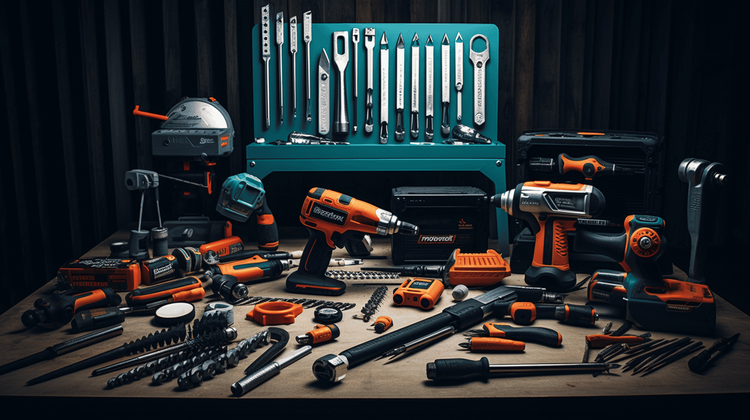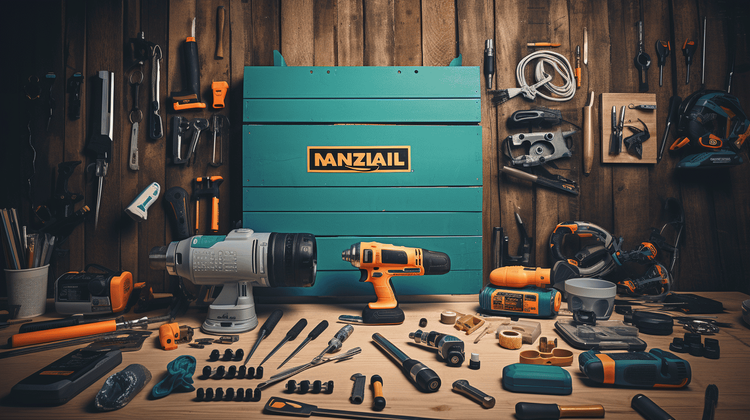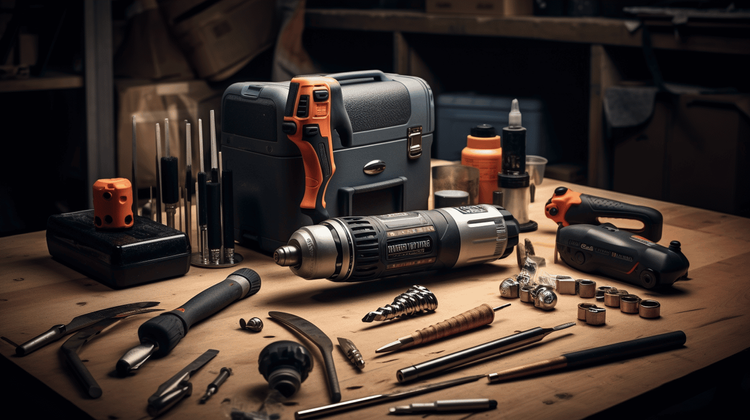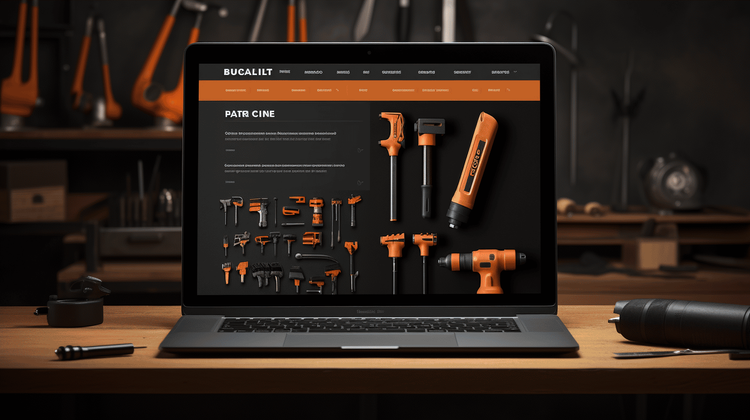DIY Expert's Recommendations: Must-Have Tools for Every DIY Enthusiast

Are you a DIY enthusiast who loves taking on projects around the house? Whether you're a beginner or a seasoned pro, having the right tools is essential for getting the job done efficiently and effectively. But with so many tools on the market, it can be overwhelming to know which ones you really need.
In this article, I'll be sharing my recommendations for the must-have tools for every DIY enthusiast. These tools will help you tackle a wide range of projects, from simple repairs to more complex renovations. Whether you're building furniture, installing fixtures, or doing general maintenance, having these tools on hand will make your DIY journey a breeze.
So, let's dive in and explore the essential tools that every DIY enthusiast should have in their toolkit. From hand tools to power tools, measuring and marking tools, fastening and clamping tools, and even specialized tools for advanced projects, I've got you covered. Let's get started!
Essential Hand Tools
When it comes to DIY projects, having the right hand tools is essential for getting the job done efficiently and effectively. These tools are versatile and can be used for a wide range of projects, from hanging pictures to assembling furniture. Here are some must-have hand tools for every DIY enthusiast:
Screwdrivers
Screwdrivers are one of the most basic and essential tools in any toolbox. They come in various sizes and types, including flathead and Phillips head. Flathead screwdrivers have a single flat blade, while Phillips head screwdrivers have a cross-shaped tip. Make sure to have a set of different screwdriver sizes to accommodate various screw sizes.
Hammer
A hammer is another indispensable tool that every DIY enthusiast needs. It is used for driving nails, removing nails, and tapping things into place. Look for a hammer with a comfortable grip and a claw on one end for nail removal. A 16-ounce claw hammer is a good all-around choice for most DIY projects.
Pliers
Pliers are versatile tools that can be used for gripping, cutting, and bending. They come in various types, such as needle-nose pliers, slip-joint pliers, and locking pliers. Needle-nose pliers are great for reaching into tight spaces, while slip-joint pliers can be adjusted to accommodate different sizes of materials.
Measuring Tape
Accurate measurements are crucial for any DIY project, and a measuring tape is the go-to tool for this. Look for a measuring tape that is at least 25 feet long and has both metric and imperial measurements. A tape with a lock feature can help ensure that your measurements stay in place.
These essential hand tools are the building blocks of any successful DIY project. They are worth investing in as they will serve you well in a wide range of projects.
Power Tools for Efficiency
When it comes to tackling DIY projects, power tools are a game-changer. These tools are designed to make your work easier and more efficient, allowing you to complete tasks in a fraction of the time it would take with traditional hand tools. Whether you're a seasoned DIY enthusiast or just starting out, having the right power tools in your arsenal is essential. Let's take a look at some must-have power tools for every DIY enthusiast:
Power Drill
A power drill is the most versatile tool in any DIYer's collection. With a power drill, you can effortlessly drill holes and drive screws with just a push of a button. Look for a drill that has adjustable speed settings and comes with a variety of drill bits and screwdriver bits. This will allow you to tackle a wide range of projects, from hanging shelves to building furniture.
Circular Saw
If you need to make straight cuts in wood or other materials, a circular saw is a must-have. This powerful tool can quickly and accurately cut through a variety of materials, making it ideal for projects like building decks, cutting plywood, or trimming door frames. Look for a circular saw with adjustable cutting depth and bevel settings for added versatility.
Jigsaw
For curved or intricate cuts, a jigsaw is your go-to tool. This handheld power tool features a thin, reciprocating blade that moves up and down, allowing you to cut through wood, plastic, or metal with ease. A jigsaw is perfect for projects like cutting out shapes, making scrollwork, or trimming laminate flooring.
Orbital Sander
Once your project is complete, you'll want to give it a smooth and polished finish. That's where an orbital sander comes in handy. This power tool uses a circular sanding pad that moves in an orbital motion, ensuring a smooth, swirl-free finish. An orbital sander is great for sanding large surfaces, such as tabletops or floors, as well as smaller objects like furniture or cabinets. Look for a sander with variable speed settings and a dust collection system to keep your workspace clean.
With these power tools in your arsenal, you'll be able to tackle a wide range of DIY projects with ease. These tools are designed to make your work more efficient and precise, saving you time and effort. So, whether you're building furniture, renovating your home, or simply working on a hobby project, investing in quality power tools is a decision you won't regret.
Cutting and Shaping Tools
When it comes to DIY projects, having the right cutting and shaping tools is essential. These tools allow you to cut through materials with precision and create intricate shapes to bring your ideas to life. Whether you're working with wood, plastic, or metal, these cutting and shaping tools will make your projects a breeze. Here are some must-have cutting and shaping tools for every DIY enthusiast:
Utility Knife
A utility knife is a versatile tool that can handle various tasks. It features a retractable blade that can be used to cut through a wide range of materials such as cardboard, carpet, drywall, and more. It's perfect for scoring and trimming materials, especially when you need precise cuts. With a utility knife in your toolkit, you'll be able to tackle a variety of DIY projects with ease.
Chisel Set
A chisel set is a must-have tool for woodworking projects. It consists of different sizes and shapes of chisels that can be used to carve, shape, and remove wood. Whether you're working on intricate carvings or need to create a mortise and tenon joint, a chisel set will help you achieve clean and precise cuts.
Files and Rasps
Files and rasps are indispensable tools for smoothing and shaping rough edges and surfaces. They are commonly used in woodworking, metalworking, and even pottery. Files are ideal for removing material quickly, while rasps are great for shaping and smoothing curves. Having a set of files and rasps in your arsenal will ensure that you're able to achieve a smooth and professional finish on your DIY projects.
Hand Saw
A hand saw is a classic cutting tool that should not be overlooked. It's perfect for making straight cuts in wood, plastic, and even metal. Hand saws come in different types, such as crosscut saws for cutting across the wood grain and rip saws for cutting along the grain. They are ideal for small to medium-sized projects where a power saw may not be necessary. With a hand saw, you'll have the flexibility to make precise cuts wherever you need them.
These cutting and shaping tools will help you achieve professional-looking results in your DIY projects. Whether you're working with wood, plastic, or metal, having these tools in your toolkit will make your projects easier and more enjoyable. Remember to always use these tools safely and follow proper techniques for the best results. Happy DIYing!
"The chisel and the knife have done more good things than the whole of the medical profession." - Robert Green Ingersoll
Measuring and Marking Tools
When it comes to DIY projects, having precise measurements and accurate markings is crucial for achieving professional-looking results. That's where measuring and marking tools come in. These tools help ensure that your cuts are straight, your angles are precise, and your projects are aligned perfectly. Let's explore some essential measuring and marking tools that every DIY enthusiast should have in their toolkit:
Level
A level is a must-have tool for any DIY project that requires straight, level surfaces. Whether you're hanging shelves, installing trim, or building furniture, a level will help you achieve a professional finish. There are several types of levels available, including bubble levels and laser levels. Choose the one that suits your needs and budget.
Squares
Squares are versatile tools that come in different sizes and shapes, such as combination squares, try squares, and speed squares. They are used for measuring and marking right angles accurately. Squares are indispensable for tasks like checking corners, marking square lines, and ensuring precise cuts. Invest in a good-quality square that will last for years.
T-bevel
A T-bevel, also known as a sliding bevel, is used to measure and transfer angles. This tool consists of a handle and a blade that can be adjusted to any angle. T-bevels are particularly useful for projects that require angled cuts, such as molding installation or creating angled joints. A quality T-bevel will give you the flexibility to measure and transfer angles accurately.
Marking Gauge
A marking gauge is a tool used to mark precise measurements for woodworking projects. It consists of a beam, a marking pin, and an adjustable fence. By setting the gauge to the desired measurement and running it along the edge of the material, you can create accurate reference lines for cutting or joining. A marking gauge is an essential tool for woodworking and ensures clean and precise cuts.
Having these measuring and marking tools in your arsenal will significantly improve the precision and quality of your DIY projects. Remember to choose tools that are durable, accurate, and comfortable to use. With the right measuring and marking tools, you'll be able to tackle any DIY project with confidence and achieve professional results.
Fastening and Clamping Tools
When it comes to DIY projects, fastening and clamping tools are essential for securely joining materials together and holding them in place. These tools allow you to achieve precise and sturdy connections, ensuring the success of your project. Whether you're a seasoned DIY enthusiast or just starting out, having the right fastening and clamping tools in your toolbox will make your life a whole lot easier. Here are some must-have fastening and clamping tools that every DIY enthusiast should consider:
Cordless Nail Gun
A cordless nail gun is a game-changer when it comes to fastening materials quickly and efficiently. It uses compressed air or battery power to drive nails into wood or other materials with ease. Unlike traditional hammers, a nail gun eliminates the need for manual labor and reduces the risk of bent nails or sore thumbs. Whether you're building furniture, installing trim, or framing walls, a cordless nail gun will save you time and effort.
C-Clamp
A C-clamp is a versatile tool that can be used for a variety of applications. It has a simple design with a screw mechanism that allows you to tighten or loosen the clamp to hold materials together. C-clamps are perfect for securing pieces of wood, metal, or plastic during gluing, welding, or painting processes. They provide a strong grip and ensure stability while you work on your project.
Bar Clamps
Bar clamps are similar to C-clamps but have a longer reach and a sliding bar mechanism. They are perfect for clamping larger materials or multiple pieces together. Bar clamps provide uniform pressure along the entire length of the clamp, ensuring an even and secure bond. They are ideal for woodworking projects such as assembling cabinets, tables, or bookshelves.
Wood Glue
While not a traditional tool, wood glue is an essential fastening agent for any woodworking project. It creates a strong bond between two pieces of wood, providing long-lasting durability. Wood glue is easy to use, dries clear, and can be sanded and painted over once dry. It's perfect for joining wood of all sizes and can be used with other fastening tools like clamps to ensure a solid connection.
Having these fastening and clamping tools in your arsenal will empower you to tackle a wide range of DIY projects with confidence. Whether you're constructing furniture, renovating your home, or just working on small repairs, these tools will make the job easier and help you achieve professional-looking results. So, invest in these tools and take your DIY skills to the next level!
"Good tools are the great facilitators of human life." -Bill Gates
Safety Gear and Equipment
When it comes to any DIY project, safety should always be a top priority. It's important to have the right safety gear and equipment to protect yourself from potential hazards and accidents. Here are some must-have safety gear and equipment for every DIY enthusiast:
- Safety Glasses: Protect your eyes from flying debris, dust, and chemicals with a sturdy pair of safety glasses. Always wear them when using power tools or working with materials that can cause eye injuries.
- Protective Gloves: Invest in a good pair of protective gloves to shield your hands from cuts, abrasions, and chemicals. Choose gloves that fit well and provide proper dexterity for handling tools and materials.
- Dust Mask: Protect your lungs from dust, particles, and harmful chemicals by wearing a dust mask. A properly fitted mask can prevent respiratory issues and ensure a healthier and safer work environment.
- Earplugs: Power tools and machinery can generate noise levels that can damage your hearing. Use earplugs to reduce the risk of hearing loss and protect your ears from loud noises during DIY projects.
Remember, safety should never be compromised, so always wear the appropriate safety gear for the task at hand. It's better to be safe than sorry!
"Safety first! Having the right safety gear and equipment is essential for every DIY enthusiast. Protect yourself from potential hazards and accidents by investing in quality safety gear."
Storage and Organization
When it comes to DIY projects, having the right tools is just one part of the equation. The other part is keeping those tools organized and easily accessible. Without proper storage and organization, you may find yourself spending precious time searching for the right tool or dealing with a cluttered workspace. To help you keep your DIY projects running smoothly, here are some essential storage and organization solutions:
Toolbox or Toolbox System
A toolbox is a must-have for any DIY enthusiast. It's a portable storage solution that allows you to keep your tools in one place and easily transport them to different project sites. Look for a toolbox with multiple compartments and dividers to keep your tools organized. If you have a large tool collection, consider investing in a toolbox system, which consists of a large toolbox with smaller interlocking boxes that fit inside. This system allows you to customize the organization of your tools and expand the storage as needed.
Workbench
A sturdy workbench is essential for any DIY project. It provides a dedicated space for you to work on your projects and keeps your tools easily accessible. Look for a workbench with a solid surface and built-in storage options such as drawers and shelves. Consider the size of your projects and the space available in your workshop when choosing a workbench. If you have limited space, consider a foldable or portable workbench that can be easily stored when not in use.
Wall-mounted Storage
Utilizing the wall space in your workshop is a great way to save floor space and keep your tools organized. Install wall-mounted storage solutions such as pegboards, hooks and shelves. Pegboards are versatile and allow you to hang your tools and accessories for easy access. Hooks can be used to hang larger tools such as saws and drills. Shelves can be used to store containers of small items like nails, screws and bolts. Make sure to label and categorize your tools and supplies for efficient organization.
Pegboard
A pegboard is a versatile and customizable storage solution that allows you to hang your tools for easy access. It consists of a board with evenly spaced holes and hooks that attach to the holes. You can hang various tools and accessories on the hooks, keeping them within reach. Pegboards come in different sizes, so choose one that fits your available space and tool collection. Arrange your tools in a logical and organized manner, grouping similar tools together. This will make it easy to find the tool you need for a particular project.
With the right storage and organization solutions, you can ensure that your tools are easily accessible and your workspace is clutter-free. This will not only save you time but also make your DIY projects more enjoyable. Take the time to invest in proper storage solutions and set up an organized workspace. Your future self will thank you for it!
In the next section, we will explore some specialized tools that can take your DIY projects to the next level.
Specialized Tools for Advanced Projects
If you're a seasoned DIY enthusiast looking to take your projects to the next level, specialized tools can help you achieve professional-level results. These tools are designed to handle more complex tasks and can save you time and effort in completing advanced projects. Here are some must-have specialized tools for advanced DIY projects:
Router
A router is a versatile tool that can be used for a variety of tasks, including shaping edges, cutting grooves, and creating decorative patterns. It allows you to create intricate designs and precise cuts in wood, which is essential for projects like cabinetry, furniture making, and woodworking crafts. With different router bits, you can achieve different effects and add a unique touch to your projects.
Miter Saw
A miter saw is a powerful tool that is perfect for making precise crosscuts and miter cuts. It is commonly used for cutting moldings, trim, and framing materials. With a miter saw, you can easily achieve clean and accurate angled cuts, making it essential for projects like building decks, installing flooring, and making picture frames.
Paint Sprayer
If you're planning on painting large surfaces or doing a lot of painting projects, a paint sprayer can be a game-changer. It allows you to apply paint evenly and quickly, saving you time and providing a professional finish. Whether you're painting walls, furniture, or outdoor surfaces, a paint sprayer can make the job much easier and give your projects a flawless look.
Tile Cutter
If you're planning on tackling a tiling project, a tile cutter is a must-have tool. It allows you to make straight cuts and precise angles in tiles, ensuring they fit perfectly in your space. Whether you're tiling a bathroom, kitchen backsplash, or outdoor patio, a tile cutter will help you achieve clean and professional-looking results.
Remember, specialized tools are designed for specific tasks and may require some practice to master. It's important to read the instruction manual and take necessary safety precautions while using these tools. And don't forget to wear proper protective gear like safety glasses and gloves.
Investing in specialized tools will not only make your advanced DIY projects easier but also open up new possibilities for creativity and craftsmanship. So, if you're ready to take your DIY skills to the next level, consider adding these specialized tools to your toolbox. Happy DIYing!
Conclusion
Conclusion
In conclusion, having the right tools can make all the difference when it comes to tackling DIY projects and making them a success. Whether you're a seasoned DIY enthusiast or just starting out, investing in a quality set of tools is essential. Not only will they make your tasks easier and more efficient, but they will also ensure that your projects turn out looking professional and well-crafted.
Remember, it's important to have a well-rounded collection of tools that covers the essential hand tools, power tools, cutting and shaping tools, measuring and marking tools, fastening and clamping tools, safety gear and equipment, storage and organization solutions, and specialized tools for advanced projects. Each tool has its own unique purpose and can greatly enhance your DIY experience.
When it comes to purchasing tools, it's always best to invest in quality. Cheap tools may seem like a tempting option at first, but they often lack durability and precision, which can lead to frustration and poor results. Opting for reputable brands and reliable tools will ensure that you can depend on them for years to come.
At Ultra Handy, we understand the importance of having the right tools for your DIY projects. That's why we offer a wide range of high-quality tools and equipment in our eCommerce Amazon store. Whether you're in need of a power drill, a set of pliers, or a sturdy workbench, you'll find everything you need to get started or level up your DIY game.
So why wait? Visit our Amazon store at ultrahandy.com and explore our collection of tools today. Don't forget to equip yourself with the right tools and unleash your creativity and handy skills. Happy DIYing!
Frequently Asked Questions
- What are the essential tools for every DIY enthusiast?The essential tools for every DIY enthusiast include a hammer, screwdriver set, drill, measuring tape, pliers, level, utility knife, adjustable wrench, and a set of various-sized nails and screws.
- Do I need all these tools as a beginner in DIY projects?As a beginner in DIY projects, you may not need all the tools at once. Start with a basic toolkit that includes a hammer, screwdriver set, measuring tape, and pliers. Gradually expand your collection as you take on more projects.
- Should I invest in battery-powered tools or corded ones?The decision between battery-powered tools and corded tools depends on your preferences and the type of projects you undertake. Battery-powered tools offer more portability, whereas corded tools often provide more power. Consider your needs and choose accordingly.
- Where can I find high-quality DIY tools?High-quality DIY tools can be found at various places such as home improvement stores like Home Depot or Lowe's, online marketplaces like Amazon, and specialized tool shops. Research different brands, read reviews, and compare prices to make an informed decision.
- Are there any safety precautions I should be aware of when using DIY tools?Yes, safety is paramount when using DIY tools. Always wear appropriate protective gear like safety goggles and gloves. Read and follow the manufacturer's instructions for each tool. When necessary, use clamps or workbenches to secure your workpiece. Prioritize safety at all times.




